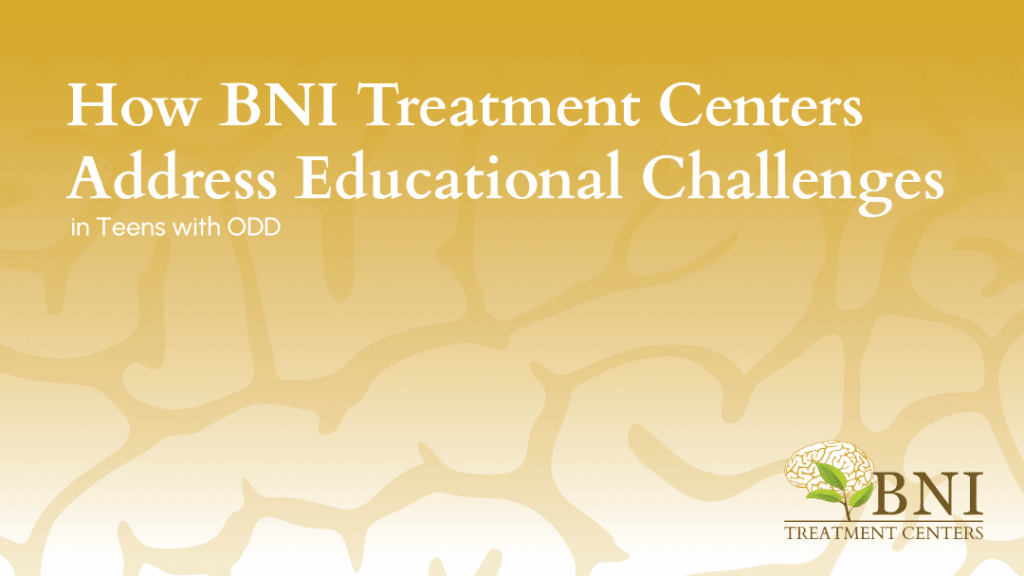Ensuring that teens get a good education is part of molding them into functioning members of adult society. For teens living with oppositional defiant disorder …
How BNI Treatment Centers Address Educational Challenges in Teens with ODD
BNI treatment’s ODD Treatment program combines evidence-based therapies such as CBT, DBT, behavior modification, and trauma-informed care to help teens gain control over their reactions, improve frustation tolerance, and develop healthier ways to communicate and cope.

Ensuring that teens get a good education is part of molding them into functioning members of adult society. For teens living with oppositional defiant disorder (ODD), achieving academic success can be especially complex.
While the difficulties faced by a teen with ODD may feel isolating, the condition is actually fairly common. As many as 3 to 5% of children in the U.S. are estimated to be diagnosed with ODD.
Academic challenges in teens with ODD are typically founded in the student’s inability to behave appropriately in a classroom setting and a desire not to cooperate with authority figures. This often results in incomplete assignments, a lack of participation in discussions, and an unwillingness to cooperate with peers.
At BNI, we specialize in treating teens with mental health conditions and behavioral issues, like ODD. We empower teens and their families to address the needs created by these conditions so they can achieve their goals and live more fulfilling lives.
Defining Oppositional Defiant Disorder (ODD) and Recognizing Core Characteristics of the Condition
Oppositional defiant disorder (ODD) is a psychological condition that presents with persistent patterns of hostile and uncooperative behavior acted out towards authority figures in a teen’s life. More than simple disagreements or attempts to assert independence, the behavior associated with ODD is consistent enough and disruptive enough to significantly impact most aspects of a child’s life, including their academics.
There are a few marked ways that ODD differs from typical childhood or adolescent disobedience or disruptive behavior. Foremost, it must occur weekly for at least 6 months in order for a child to qualify for a diagnosis. This behavior does not subside over time. While the symptoms of ODD typically begin in early childhood, in some cases as early as 3 or 4 years of age, the symptoms become more pronounced as the child reaches adolescence. At this time, a teen with ODD will often become increasingly vindictive, argumentative, and unwilling to comply with requests.
ODD is characteristically a comorbid condition, meaning that it typically occurs in conjunction with another condition. Typical comorbidities with ODD include anxiety, depression, and substance use disorders. Attention deficit hyperactivity disorder (ADHD) is another condition that commonly co-occurs with ODD. How these conditions interact and compound with each other can cause complex issues for teens with the condition, especially when it comes to school.
This is a serious condition that requires treatment. Most teens will not simply grow out of this behavior.
Etiology and Risk Factors of ODD in School-Aged Children
ODD is a multifactorial condition, so there is no one reason that a child will develop the condition. There are several potential causes for ODD, as well as factors that predict the severity of the condition in individual cases.
3 potential causes for ODD include:
- Family history: Children and teens whose close relatives are living with a mood condition, such as bipolar disorder or major depressive disorder, are at greater risk of developing the condition. A family history of conditions that typically co-occur with ODD, including ADHD, could also put a child at greater risk of developing the condition. While studies suggest that there is a genetic component to the development of ODD, there is no “ODD gene.”
- Brain structure: Meta-analysis performed on neuroimaging of the brains of children with ODD indicates that there are distinct brain differences between children with ODD and the general population. Data shows abnormalities in the bilateral amygdala, bilateral insula, right striatum, and left medial/superior frontal gyrus as well as the left precuneus. These regions of the brain are involved in emotional processing, self-control, and social behavior.
- Environmental contributors: A young person whose environment plays a role in whether or not they’re likely to develop ODD. For example, children who have experienced neglect or physical and emotional abuse are more likely than their peers to develop ODD. Other environmental factors, such as a lack of structure, supervision, or enforced boundaries, could also contribute to the development of the condition.

How Does Oppositional Defiant Disorder Affect Teen Education?
ODD can have a severe impact on a teen’s ability to succeed in an academic environment. School settings rely heavily on hierarchy and authority. For students with ODD, this triggers feelings of frustration and resentment, making it difficult for effective learning to take place without intervention. For many children with ODD, school is where their symptoms become the most pronounced.
Classroom Disruption at School Due to ODD
Children living with ODD often become disruptive in a classroom setting. They may argue with their teacher, refuse to participate in classroom activities, and constantly question the rules that a teacher has set in place. These disruptions may give the teen a sense of control over their environment.
Often, teens with ODD also come into conflict with other students. This could involve being easily annoyed by and lashing out at others, intentionally doing things to upset their peers, and exacting revenge over perceived wrongs.
These disruptive behaviors create a hostile environment for everyone in the classroom. It makes learning difficult not just for the teen who is experiencing ODD but for their peers as well.
Academic Issues and Hindrances to Learning Common With ODD
Many teens with ODD go through periods of poor academic performance. This is not always a reflection of a teen’s intelligence or academic abilities. In some cases, underperforming with schoolwork is an intentional act of defiance, which gives a teen a better sense of control.
For other students with ODD, aggressive behavior at school may be related to an inability to focus on their schoolwork or perform at the same level as their peers. These students often need additional support to succeed academically.
When it comes to understanding the relationship between ODD and academic performance, it’s important to consider the impact of co-occurring conditions. For example, ADHD can make it difficult for students to learn in traditional school settings without careful interventions.
Potential Repercussions From the School Related to ODD
The behaviors associated with ODD often result in repercussions at school. This could include several potential issues:
- Write-ups
- Detention
- Loss of privileges, like participating in extracurriculars
- In-school Suspension
- Out-of-school suspension
- Placement in an alternative educational program
- Expulsion
After a certain point, these repercussions become less about punishing the individual student and more about preserving the classroom environment for their peers.
In many cases, students with ODD need additional emotional and psychological support beyond what’s available to them in their school and home settings. To prevent further repercussions and ensure that students receive adequate education, therapeutic interventions become necessary.
How BNI Can Address Educational Challenges in Teens with ODD
At BNI, we take a multifaceted approach to empowering children with ODD and their families to face educational challenges.
Common intervention methods include:
- Cognitive behavioral therapy (CBT): In CBT, teens with ODD focus on developing a therapeutic relationship with a trained therapist and understanding the relationship between their thoughts, feelings, and behaviors. When it comes to managing educational challenges, CBT allows teens to get to the root of their problems with school and develop tools for honoring their emotions without participating in disruptive behaviors.
- Cognitive problem-solving is a tool often used within CBT. This encourages teens with ODD to identify problems, find meaningful solutions, and discover ways to implement those solutions in their daily lives at school.
- Parent management training (PMT): This therapeutic technique is focused on equipping parents to handle problematic behaviors as they arise. By empowering parents with the skills to encourage positive behaviors, they’re able to support their teens’ academic needs.
- Academic support during treatment: Some teens living with ODD and other co-occurring conditions need to take time off for inpatient treatment. During that time, a child must stay up-to-date on their schoolwork. That’s why we provide academic support for students receiving treatment at BNI. This includes on-site tutors, computer stations, and academic support staff who are trained to coordinate with school officials.

Getting Treatment for Teens With ODD in Los Angeles
High school isn’t an easy time for a lot of teens, and ODD can make it even more complicated. The right ODD treatment plan will empower teens to face their educational challenges head-on. Treatment will equip them with the tools they need to regulate their emotions, manage their interpersonal interactions, and find academic success.
BNI Treatment Centers provides mental health care for teens in the Los Angeles area. Our facilities are owned and operated by psychiatrists and clinicians who tailor all treatment plans to clients. This also means that changes to treatment plans, as well as prescriptions and management of medications, can be made quickly. Our experts work with teens with complex conditions every day and empower adolescents to live healthy, fulfilling lives. If your teen could benefit from our care, call us at (888) 522-1504.
BNI Treatment Centers: Science-based, evidence-backed, compassion-led.
About the Author

Arastou Aminzadeh, M.D.
Dr. Arastou Aminzadeh or Dr. A as most teens refer to him, has been working in variety of clinical settings for the last 20 years. He is well respected nationally for his expertise in Addiction medicine and treating adolescents. Dr. A is a triple board certified physician in psychiatry, Child and Adolescent psychiatry and Addiction medicine.

Oliver Ahmadpour, M.D.
Dr. Oliver Ahmadpour is an adult and child psychiatrist with nearly four decades of experience in the field of medicine with an M.D. degree from Sweden, where he practiced as an Internal Medicine physician. In the U.S. he completed his Post-Doctoral Fellowship in Endocrinology at UCSD, and his Residency and Fellowship in Adult, Child, and adolescent Psychiatry at USC Keck School of Medicine.
Free Insurance Verification
News & Resources for Families
Check Out Our Recent Articles
Frequently Asked Questions
We treat a wide range of teen mental health challenges including anxiety, depression, bipolar disorder, OCD, trauma-related disorders, behavioral issues, ADHD, oppositional defiance, substance use, and dual-diagnosis conditions. Many families come to BNI after struggling to find the right level of care elsewhere.
Most private insurance plans cover a significant portion of treatment. Our admissions team verifies benefits quickly and explains coverage, deductibles, and out-of-pocket expectations before admission. We do not accept Medi-Cal or Medicare.
Yes. Many families come to BNI with teens who have complex diagnoses, treatment-resistant depression, severe anxiety, self-harm history, or previous hospitalizations. Our clinical leadership regularly treats high-acuity cases and provides specialized expertise for them.
Absolutely. We use established, research-backed modalities including CBT, DBT, trauma-informed care, psychiatric medication management, experiential therapies, family systems work, and integrative approaches such as mindfulness, yoga, and expressive arts.
Our residential and outpatient programs are located in private, secure homes in Agoura Hills and Calabasas. These areas are known for their safety, privacy, and access to nature—ideal for focused healing and recovery.
Yes. BNI is trusted by the UCLA David Geffen School of Medicine as a training rotation site for physician fellows to learn best practices in adolescent mental health—an acknowledgment of our clinical quality and leadership in teen psychiatry.
What We Treat
Primary Mental Health

Primary Mental Health
Behavioral Issues

Behavioral Issues
Dual-Diagnosis


